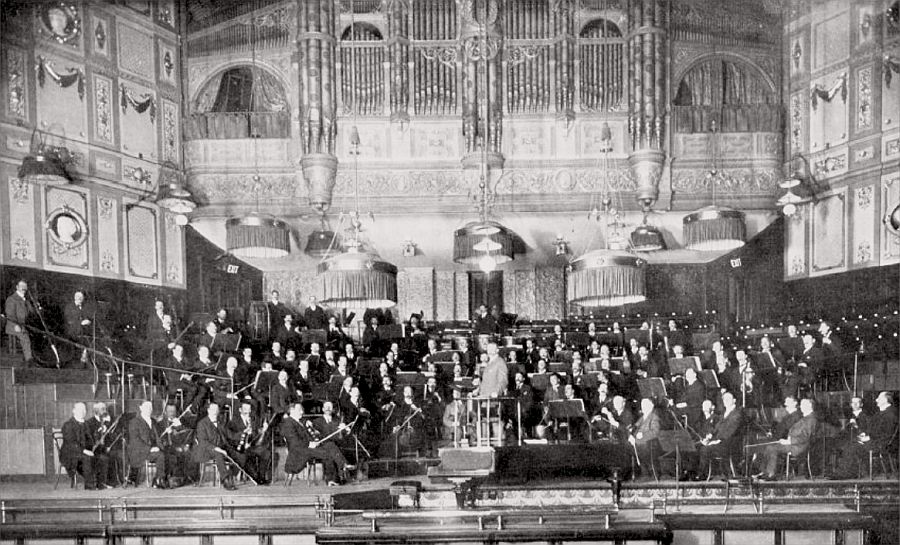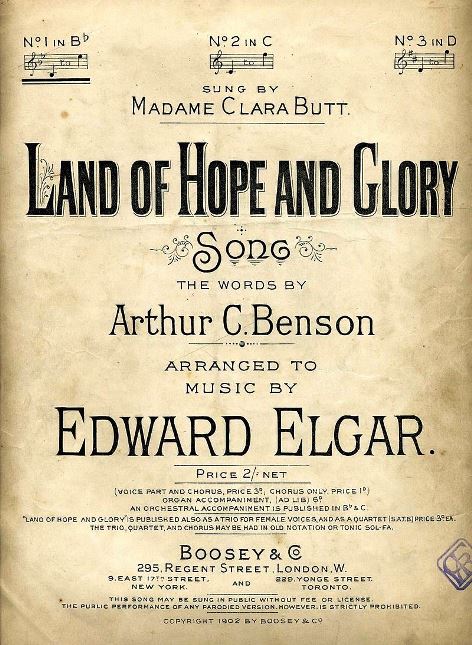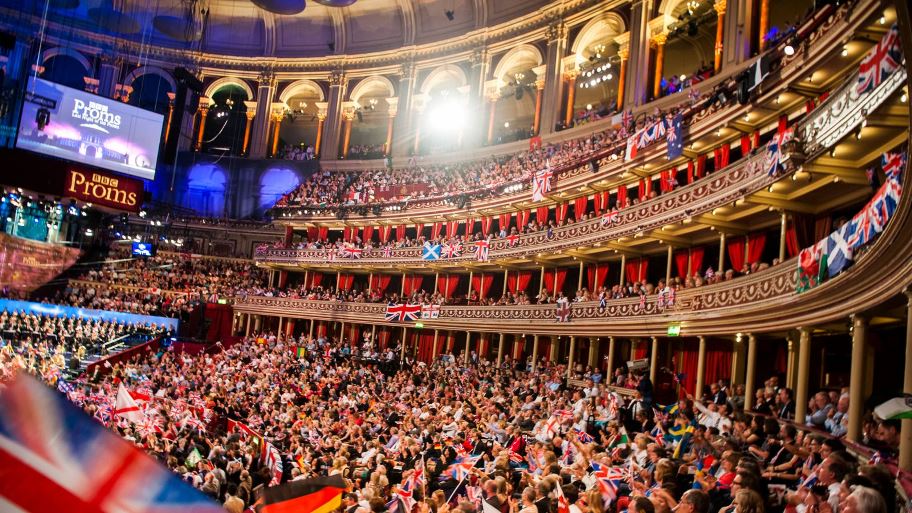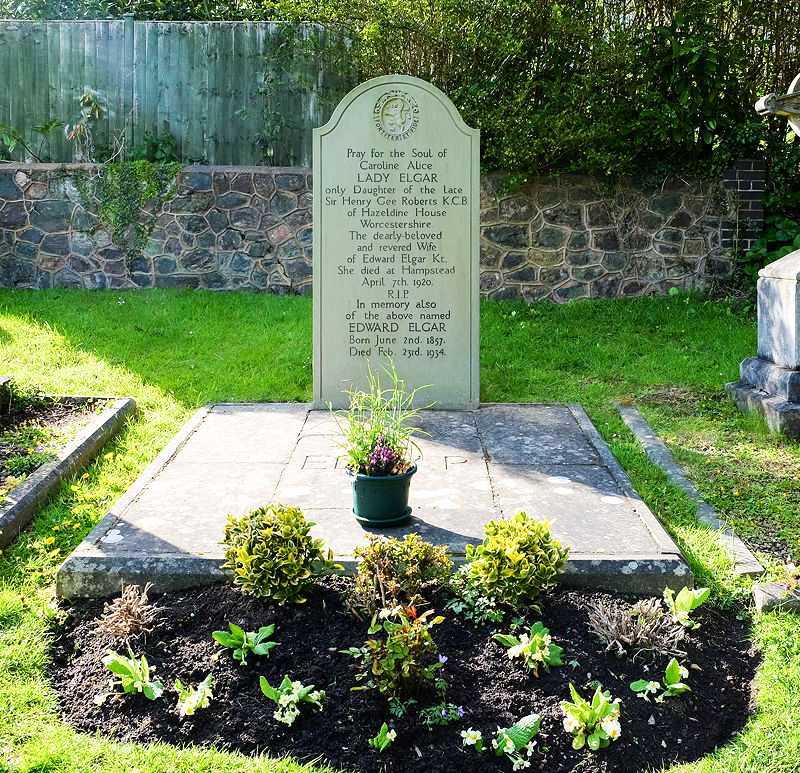Geoffrey Scargill
So what has Edward Elgar got to do with Marple and its history? The answer would seem to be, quite a lot, as the talk by Geoffrey Scargill attracted 82 members and visitors. Yes, we are primarily interested in our local history but from the earliest days of the Society, we have wanted to examine this within the wider context of regional and national history. Elgar was an important figure of his time and his life and career could tell us much about the society of late Victorian and Edwardian England. And so it proved with Geoffrey’s incisive talk examining “The Real Enigma” of Edward Elgar.

Edward Elgar conducts the London Symphony Orchestra in 1911
 click the image to see Sir Edward Elgar Bart, OM, KCVO with the London Symphony Orchestra in "Land of Hope and Glory" - filmed in the HMV Studio in London."However, before the meeting even began we were treated to half an hour of Elgar’s music, courtesy of member, Roger Pierce, who is also the organist at St Paul’s, Compstall. It was a delightful musical prologue to the talk, or perhaps in this context it might even be described as an overture. We were presented with the Vesper Voluntaries, a set of organ pieces first published when Elgar was thirty three.
click the image to see Sir Edward Elgar Bart, OM, KCVO with the London Symphony Orchestra in "Land of Hope and Glory" - filmed in the HMV Studio in London."However, before the meeting even began we were treated to half an hour of Elgar’s music, courtesy of member, Roger Pierce, who is also the organist at St Paul’s, Compstall. It was a delightful musical prologue to the talk, or perhaps in this context it might even be described as an overture. We were presented with the Vesper Voluntaries, a set of organ pieces first published when Elgar was thirty three.
Geoffrey started by promising to be of interest to the tone deaf and the Hard Rock fanatics as well as the Elgar enthusiasts. Consequently he began with, what else but Pomp and Circumstance No 1 (Land of Hope and Glory.) Elgar was very proud of this composition, saying to a friend "I've got a tune that will knock 'em – will knock 'em flat”. It was so popular over the whole of his lifetime that in the end he was referring to it as “That damned tune” but it was one of his greatest achievements. When Henry Wood conducted it at a Promenade Concert he wrote that the audience "rose and yelled ... the one and only time in the history of the Promenade concerts that an orchestral item was accorded a double encore.” Not just in England but worldwide. In Germany and France it is referred to in English; in America it is de rigueur for most high school and university graduation ceremonies.
It had taken a long time to achieve fame and honour. By nature he was shy and at times a manic depressive. To compound these disadvantages he was a provincial from a lower-middle class background and, worst of all in that day and age, a Catholic. He was determined to pursue a career in music and held a variety of jobs in the Worcester area but he visited London whenever he could. Whilst there he had some advanced studies with Adolf Pollitzer, the Director of the London Academy of Music and one of the foremost violinists of the day. Pollitzer believed that Elgar, as a violinist, had the potential to be a leading soloist but Elgar himself, with his inferiority complex, decided his playing lacked a full enough tone so he abandoned that ambition.
He needed someone to give him confidence and he found that person in Alice Roberts. They met when he took her on as a pupil but the relationship gradually deepened despite the opposition of her parents. There was a big differential in age as she was eight years older than Elgar but the real obstacle was his religion. Despite this they got married and she was immediately disinherited. But she recognised him as a genius, writing in her diary, ‘The care of a genius is enough of a life work for any woman.” From then until her death she acted as his business manager and social secretary, dealt with his mood swings and was a perceptive musical critic. As an engagement present Elgar dedicated a short violin-and-piano piece to her. It was originally entitled ‘Liebesgruss’ and he sold the work to a German publisher. However, the publisher, even though he was German, changed the title to ‘Salut d’Amour’ as he had more marketing savvy than Elgar. It was, and still is, very popular but as Elgar had sold the rights for £5 he saw very little benefit.
Their first few years together were a continuing struggle. They moved back to London but it was harder to get recognition or work there than in Worcester so the moved back, this time with a new baby girl Carice, whose name was derived from her mother’s names Caroline Alice. He gradually built up a reputation as a composer and some of his choral works were modestly successful but it was not until 1899 that he made his breakthrough with the ‘Enigma Variations.’ It was premiered in London and was received with general acclaim for its originality, charm and craftsmanship.

Last Night of the Proms - in the Albert Hall
He was recognised as the pre-eminent British composer of his generation and when Sir Arthur Sullivan died the following year, he was recognised as the natural successor. Other musical successes followed - The Dream of Gerontius which established his reputation in Germany and France, The Pomp and Circumstance Marches, his First Symphony and the Violin Concerto as well as commissioned work for two coronations. There were also material honours as the establishment finally began to accept him. Honorary degrees, a knighthood in 1904, the Order of Merit in 1911 and appointed as Master of the King’s Music in 1924. However, the First World War marked a turning point and by the early 1920s his music was no longer in fashion. Alice, his wife, died in 1920 and Elgar was devastated but he did not completely abandon composition.

The grave of Alice and Edgar Elgar in Little Malvern
Throughout his life he was a complex personality and many aspects were brought out in his music but it is perhaps the Enigma Variations that came closest to revealing his spirit and soul. In naming the theme ‘Enigma’ Elgar posed a challenge which has never been conclusively answered. Geoffrey did his best with a very perceptive talk but even he could not resolve the final enigma. But he probably didn’t want to. Without an enigma Elgar would not be the composer we know.
For the record the music played before and during the talk was:
- Vesper Voluntaries. Op. 14
- Pomp and Circumstance March No 1 in D
- Enigma Variations No 9 “Nimrod”
- Salut d’Amour Op.12
- Finale of The Apostles
- Enigma Variations No 14 Finale
Neil Mullineux - March 2024
Note:
The 100th edition of the arts television programme Monitor BBC was broadcast on 11 November 1962. It was a special film dedicated to the life of Edward Elgar, made by Ken Russell.
Geoffrey Scargill was of the opinion that this is a definitive work on Elgar, loved by Elgar aficionados.
"A partly dramatised account of the life of Sir Edward Elgar classical composer. Huw Wheldon narrates the life story over backdrops of beautiful mountain scenery, especially memorable is the image of young Elgar riding his horse around Malvern Hills."

